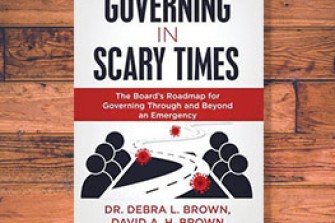The central idea is that it is better to be relaxed and low key, and not to make a big deal.Parker sees this as a ‘ubiquitous strain of 21st-century culture’ which is infecting our gatherings. She is concerned that being ‘chill’ is really selfishness but disguised as kindness.She urges hosts of all kinds to use their proper powers.
This concept is directly relevant to those who chair governing boards. When we examined the chair’s role in detail in our previous issue we said that ‘without an effective chair, all bets on the adequacy of board performance are off’.
In most cases, unproductive board meetings, or meetings that go off the rails in some way, can be tracked to some aspect of ineffectual board leadership. Parker’s rhetorical question—‘who wants to sail on a skipperless ship?’—is directly relevant to many of the board meetings we would rather have not attended.
All governing board chairs have positional power. Many may also have a form of personal power that carries weight in the boardroom. But they need to own their power and, in Parker’s terms, ‘lift a hand to the wheel’. Abdication of that power—the failure to use it, for example, to direct a board meeting efficiently and effectively to its intended outcome—fails the board, management and the organisation.
The problem with chill
Chairs who are too chill fail to realise that pulling back from exercising their power creates a vacuum that others can fill. When other directors step into this vacuum it is quite possible they will exercise power in a manner that is inconsistent with the needs of the board and the meeting.
Parker illustrates the vacuum problem with the example of a university professor responsible for a course on leadership. He entered the lecture theatre on the first day, sat head down and said nothing. As a result of his silence and non engagement there was a growing unspoken confusion amongst the students. They were disoriented and did not know what to do. Some eventually began to act up. When the professor, the traditional classroom authority, did not play his role, the students were left to ‘navigate the treacherous road themselves’. Eventually, after about five minutes, the professor looked up at the class and, to everyone’s great relief, welcomed them to the course. He had just demonstrated very effectively to his students what happens when you abdicate leadership. You do not eradicate power, you just hand the opportunity to other pretenders to the throne.
Authority is an ongoing commitment
It is not enough to just use your authority early in the meeting even if it is to good effect—for example, to set a purpose, direction and ground rules. All these things require enforcement. If you do not enforce them, it is likely someone else will step in and direct the meeting to their own inclinations.
When a chair fails to exert his or her authority—and enforce it—other members of the board get irritated and frustrated. They grumble during and after the meeting because they feel poorly governed and unprotected by you. So, what compels you to hang back? Parker suggests that it could because you convince yourself you are being generous.
Not-for-profit board leaders are often vulnerable to this. They convince themselves that because the organisation has, say, a core value of equality, they should not exert their authority. At most board meetings it is inevitable that someone will have a burning issue that is not on the agenda. In trying to be generous to a fellow board member—a peer—the chair does not enforce the agenda. And in such a situation Parker suggests that no one else intervenes to bring the meeting back on track either, in part because they, as equals, would not feel entitled to.
If this is an ongoing pattern, meetings inevitably become dominated by those with informal sources of power like greater length of service on the board, wider professional reputation, perceived influence with a key stakeholder, important subject matter expertise, force of personality, etc.
Generous authority
Parker emphasises that—while an essential step along the path is making peace with the necessity and virtue of using your power—it does not mean you cannot exercise that power with generosity. A board meeting run on generous authority is run with a strong, confident hand, but it is run selflessly, for the sake of others. This is entirely consistent with the concept of servant leadership.
Generous authority is imposing in a way that serves your colleagues. It spares them from chaos and anxiety, and from the domination of others whom you have unwittingly enabled.Sometimes it even requires a willingness to be disliked to make sure that your colleagues have the best experience of your joint enterprise.
Parker’s message is not that you should be domineering but that you should find the courage to be authoritative in the service of three goals. We think her reference to guests is not a bad way for a chair to think about his or her fellow board members.
1. Protect your ‘guests’
From, for example, each other, from boredom, or from the addictive technologies that lurk in our pockets. We may feel bad saying No, but it can be easier when we do say it to understand who and what we are protecting.
A primary case for a board chair is applying an agreed code of conduct to all directors equallyand consistently—or for that matter any other policies, procedures or rules that have been agreed to enhance the board’s effectiveness. It means anticipating and dealing with some people’s inclinations when they don’t consider the betterment of the whole board or the meeting experience. Bad or inconsiderate behaviour happens but it is your job as chair to kindly and graciously—but firmly—ward it off.
This does not require drama—loud interruptions or fierce application of rules—it can be done through small almost unnoticeable interventions. As Parker says, protecting your [fellow directors] is, in short, about elevating the right to a great collective experience above anyone’s right to ruin that experience.
2. Equalise your ‘guests’
In almost any human gathering there will be some hierarchy, a difference in status, imagined or real. Governing boards, in particular, benefit from directors leaving their titles, degrees and other conspicuous and not so conspicuous signals of status at the door.
A few years ago, I was privileged to help the then Chief of the Defence Force have his top executive team operate more like a governing board. Board members are inherently equals in terms of their legal status. However, this was difficult when the service chiefs (Chief of Navy, Chief of Army, Chief of Air Force) turned up in their uniforms and sat together facing the civilian heads of different support functions (HR, finance, IT, etc).
Even where people sit around the board table can have status implications (eg, how near you sit to the chair). Be aware of the power dynamics that can affect the way your board operates and be willing to do something about them.
3. Connect your ‘guests’
A third use of generous authority is in connecting those you meet to one another. It is surprising how often this is neglected as a part of board induction. Boards work far more effectively when individual directors have connected with each other as human beings, and with the executives who support them. It is easy for well-established board members comfortable in their roles to dismiss the need for this, but chairs should insist on some form of ‘getting to know you’ process whenever the membership of the board changes.
This should not just consist of the new board member introducing themselves; it should be a two-way process. I was present at a client board meeting when a new director attending his first meeting was invited to share something about himself with his new colleagues. He did so in an engaging and informative manner. He was thanked by the chair who then took the board straight into the first substantive item on the agenda. Everyone knew by now who the new director was and something about him, but this had not been reciprocated. The new director—who was blind—had gained not a hint of knowledge about his new colleagues.
Connection does not happen on its own. A board needs to build its own sense of community. The question arises once again: Are you as chair willing to use your authority and stick your neck out to make this happen?
We have reviewed here just part of one chapter of a most stimulating publication. Priya Parker’s wisdom and practical experience jumps off every page. We are sure you will also find it directly relevant to your time outside the boardroom.
Note
[1] Parker, Priya (2020) ‘The Art of Gathering: How We Meet and Why It Matters.’ London, Penguin.








